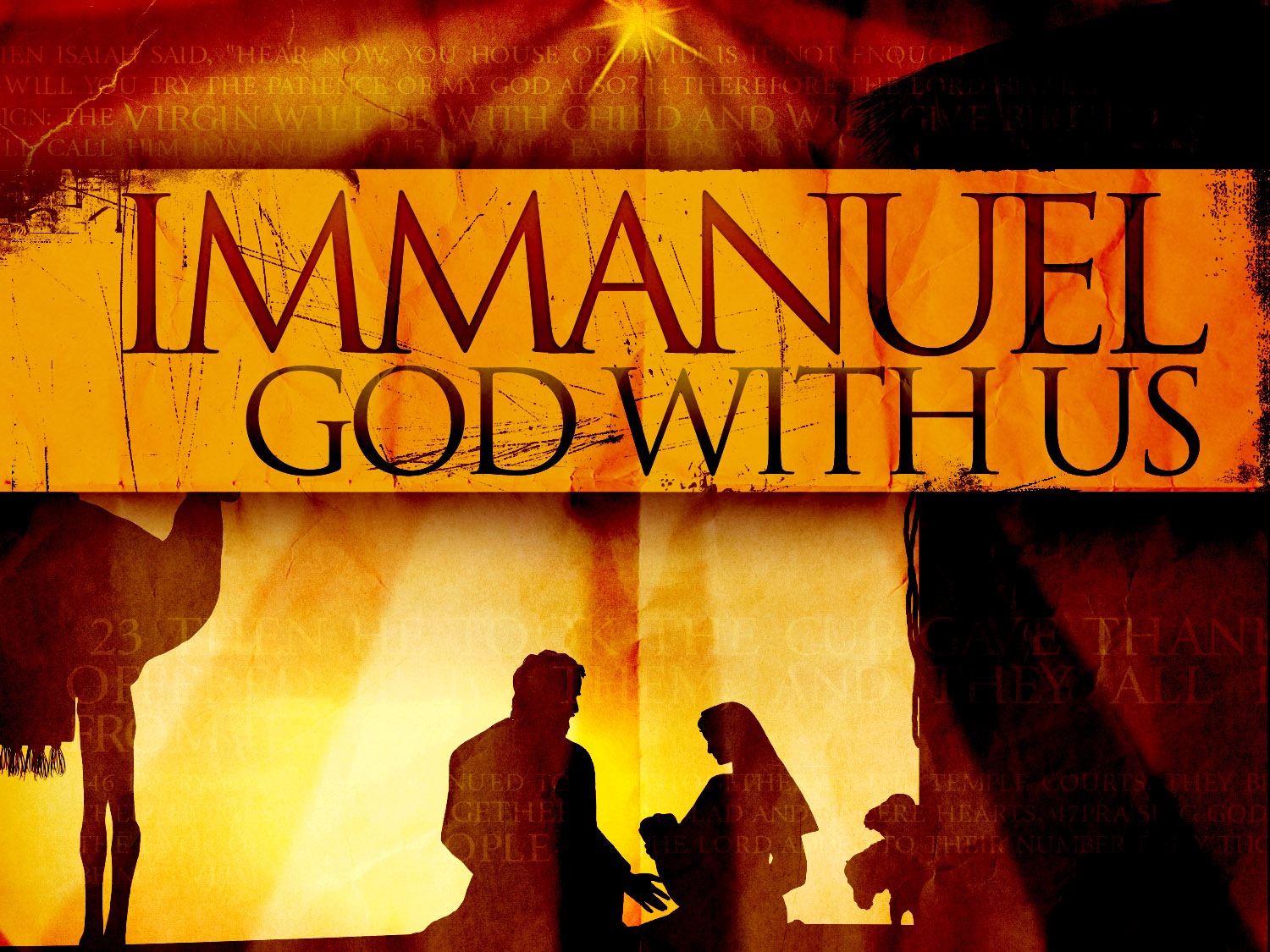 Today, Monica and I are in Geraldton, joining Craig and Janelle Palmer and the good folk of Geraldton Baptist Church in worship. They have asked me to preach on this passage as the congregation prepares for Christmas. Whenever I think of the virgin birth, I am reminded of the way Karl Barth spoke of it as the miracle which testifies to the mystery.
Today, Monica and I are in Geraldton, joining Craig and Janelle Palmer and the good folk of Geraldton Baptist Church in worship. They have asked me to preach on this passage as the congregation prepares for Christmas. Whenever I think of the virgin birth, I am reminded of the way Karl Barth spoke of it as the miracle which testifies to the mystery.
Introduction…
Do any of you remember the 1995 song One of Us by one-hit-wonderJoan Osborne?
If God had a name, what would it be
And would you call it to his face
If you were faced with him in all his glory
What would you ask if you had just one question
What if God was one of us
Just a slob like one of us
Just a stranger on the bus
Trying to make his way home
If God had a face what would it look like
And would you want to see
If seeing meant that you would have to believe In things like heaven and in Jesus and the saints and all the prophets
And yeah, yeah, God is great
Yeah, yeah, God is good
Yeah, yeah, yeah, yeah, yeah
What if God was one of us
Just a slob like one of us
Just a stranger on the bus
Trying to make his way home
He’s trying to make his way home
Back up to heaven all alone
Nobody calling on the phone
Except for the pope maybe in Rome
Amazing lyrics, amazing questions! If God had a name what would it be? If God had a face what would it look like? What if God was one of us? The lyrics express a spiritual hunger but no idea of where to look for food; and maybe a bit cynical about the things Christians would generally say about God’s greatness and goodness?
Matthew 1:18-25
This is how the birth of Jesus Christ came about: His mother Mary was pledged to be married to Joseph, but before they came together, she was found to be with child through the Holy Spirit. Because Joseph her husband was a righteous man and did not want to expose her to public disgrace, he had in mind to divorce her quietly. But after he had considered this, an angel of the Lord appeared to him in a dream and said, “Joseph son of David, do not be afraid to take Mary home as your wife, because what is conceived in her is from the Holy Spirit. She will give birth to a son, and you are to give him the name Jesus, because he will save his people from their sins.”
All this took place to fulfil what the Lord had said through the prophet: “The virgin will be with child and will give birth to a son, and they will call him Immanuel”—which means, “God with us.” When Joseph woke up, he did what the angel of the Lord had commanded him and took Mary home as his wife. But he had no union with her until she gave birth to a son. And he gave him the name Jesus.
The Miracle
Marriage in first century Palestine had two aspects. First the betrothal and then the marriage proper. The marriages were usually arranged by parents or professional match-makers. Betrothal was a legally binding arrangement that could only be set aside by divorce. The couple were understood as husband and wife although the woman remained in her parent’s home for one more year between betrothal and marriage. After the year had expired there was a formal ceremony and the marriage was consummated. Mary’s becoming pregnant during this period exposed her to public ridicule and shame, and possibly death. It also exposed Joseph to public ridicule, shame and humiliation. If he claimed the child as his own he would suffer the loss of his reputation and community standing. Who would believe the story? The idea of a virgin conception was just a ludicrous then as it is now. (‘You might think he’s an angel sweetheart, but I want a word or two with him!’)
- A modern possibility? The marvellous birth in 1895 of my great grand-father, Peter O’Neil…
Matthew doesn’t tell us how the Virgin Birth took place—except that it was by the Holy Spirit. Luke gives a little more detail, the angel telling Mary that ‘the Holy Spirit will come upon you, and the power of the Most High will overshadow you.’ The Virgin Birth is a divine miracle in the power of the Holy Spirit.
Matthew tells us two things about Jesus (Yeshua = “Yahweh Saves”): What he does: You shall call his name Jesus for he shall save his people from their sins. Many people looked forward to national, political and economic deliverance when the Son of David came in conquering power. But Matthew shows us a much deeper human need: he comes to save us from our sins—our spiritual needs far outweigh other needs.
The Mystery
The miracle of the Virgin Birth, though wonderful, is really the secondary matter in this passage, a sign of the far greater miracle and mystery of the Incarnation—the mystery of God becoming flesh and taking his place amongst us as one of us!
You see, God has become ‘one of us.’ This is one of the major differences between Christianity and Islam. For Islam, Allah is so high and so holy it is inconceivable that he could have contact with such as us—he remains aloof, untouchable and untouched by human contamination, suffering and need. He can send angels, prophets or messengers but he cannot come. Christianity is different: God didn’t just send angels, prophets and messengers—he came! In Jesus, God has come close. God has taken human nature and human life to himself—he has joined human nature to his own divine being. This is all of grace, all of God who is a God who stoops to take us by the hand.
In this respect, Matthew quotes from the Old Testament: ‘The virgin will be with child and will give birth to a son, and they will call him “Immanuel”—which means, “God with us.”’ If the name Jesus is descriptive of what Jesus does, Immanuel is descriptive of who Jesus is—God with us.
- Other texts: John 14:9; Colossians 1:15; Hebrews 1:3
The miracle of the Virgin Birth, then, points towards both the humanity and the deity of Jesus. He was a human person born in the normal way. He is also the eternal God who has come to us—the God-man. Jesus didn’t begin his existence at Christmas, but as eternal God, entered into time and space at Christmas. For unto us a Child is born, unto us a Son is given… (Isaiah 9:6).
The Meaning
So many people are ‘in the dark’ about God and don’t see him clearly. If you want to know what God is like, look at Jesus. Jesus Christ is the “Word of the Father, now in flesh appearing…” That is, he is the revelation of the will, wisdom and person of God. He is God’s communication to us, both the promise and the command of God. His teaching is the instruction of God. His death is the death of God-for-us. His resurrection is the victory of God! The meaning of Christmas is first and foremost a message of amazing grace, of a God who comes near.
The second meaning of the miracle of the Virgin Birth is a new creation, the beginning of a whole new world—what we couldn’t do for ourselves, God has and is doing. Into a world of brokenness and sadness God has come by means of a supernatural birth in the power of the Holy Spirit. But what was begun there doesn’t end there: the same Spirit who hovered over Mary and brought about a miracle of new life and transformation in her can also do the same in us! You must be born again! Regardless of who you are or what you have done—you!—can be born again, can start a whole new life as part of the new world. Jesus is the answer to our deepest needs. He is God come among us in order to save us from our sins—rescue us from the deepest cause of our alienation and brokenness. When we start from the inside out we can have hope that the entirety of our life can experience the transformation he brings.
- Philip Yancey analogy: the fish in the fish tank
- If God had a name what would it be?
If God had a face what would it look like?
What if God was one of us?



